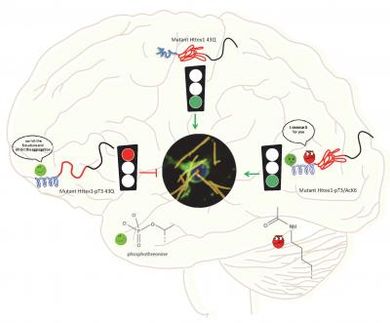Phosphoproteins no longer foil mass spectrometry
Commercial aluminium foil could be used to help scientists understand more about important biological pathways. Hubert Girault, at the Federal Polytechnic School of Lausanne, Switzerland, and colleagues used the foil to extract multi-phosphorylated peptides from digested protein mixtures.
Phosphorylation is one of the most important post-translational protein modification procedures. It regulates a wide range of biological processes, such as cell growth. Scientists are keen to learn more about the structure of phosphoproteins and peptides but because they are difficult to ionise (in particular multi-phosphorylated samples) and are present in very small amounts, it is difficult to study them by mass spectrometry (MS). MS usually only detects mono-phosphorylated peptides.
Phosphate has an affinity to metal oxides, such as aluminium oxide, and the more phosphates a peptide contains, the more strongly it is attracted to the oxide. Girault exploited this affinity and used the aluminium foil’s aluminium oxide surface layer to bind only the multi-phosphopeptides from mixtures of milk proteins. The multi-phosphopeptide enriched samples could then be more easily analysed by MS.
Girault says the foil’s selectivity for multi-phosphorylated peptides is very good and comparable with the best known methods using more complex functional materials.
Original publication: Liang Qiao, Hongyan Bi, Jean-Marc Busnel, Mohamad Hojeij, Manuel Mendez, Baohong Liu and Hubert H. Girault, Chem. Sci. 2010.
Most read news
Topics
Organizations
Other news from the department science

Get the analytics and lab tech industry in your inbox
By submitting this form you agree that LUMITOS AG will send you the newsletter(s) selected above by email. Your data will not be passed on to third parties. Your data will be stored and processed in accordance with our data protection regulations. LUMITOS may contact you by email for the purpose of advertising or market and opinion surveys. You can revoke your consent at any time without giving reasons to LUMITOS AG, Ernst-Augustin-Str. 2, 12489 Berlin, Germany or by e-mail at revoke@lumitos.com with effect for the future. In addition, each email contains a link to unsubscribe from the corresponding newsletter.
Most read news
More news from our other portals
See the theme worlds for related content
Topic World Mass Spectrometry
Mass spectrometry enables us to detect and identify molecules and reveal their structure. Whether in chemistry, biochemistry or forensics - mass spectrometry opens up unexpected insights into the composition of our world. Immerse yourself in the fascinating world of mass spectrometry!

Topic World Mass Spectrometry
Mass spectrometry enables us to detect and identify molecules and reveal their structure. Whether in chemistry, biochemistry or forensics - mass spectrometry opens up unexpected insights into the composition of our world. Immerse yourself in the fascinating world of mass spectrometry!





















































